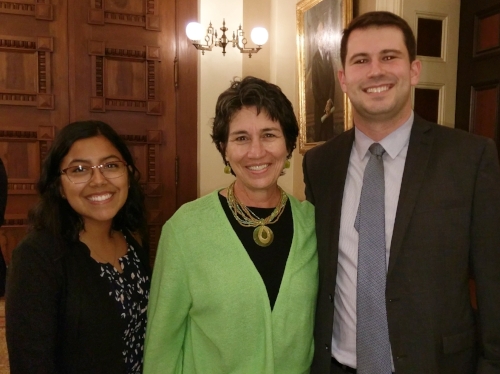Governor Brown Signs Good Samaritan Food Donation Act
CAW's Melissa Romero and Nick Lapis with Assemblymember Susan Talamantes Eggman (center).
SACRAMENTO –Governor Brown has signed AB 1219 into law, a bill that will drastically cut the amount of edible food that is wasted and make more food available to those in need. In 1977, Brown signed the first-in-the-nation food donor liability protection law during his first term as Governor, and in signing AB 1219 he carries on his legacy of prioritizing food donation.
AB 1219, the California Good Samaritan Food Donation Act authored by Assemblymember Susan Talamantes Eggman (D-Stockton), strengthens and expands on the state’s existing liability protections for food donors. “Reducing food insecurity is an achievable goal. My bill will cut down the amount of food ending up in landfills by encouraging donors to help hungry Californians,” said Assemblymember Susan Eggman about AB 1219. The bill requires health inspectors to educate businesses about the laws that exist to protect food donors from liability, which is the first time that a state has mandated widespread outreach for food donation laws.
“Getting food to people who need it is the highest and best use of food that would have otherwise been sent to a landfill,” said Melissa Romero, Policy Associate for Californians Against Waste, a co-sponsor of the bill. “The requirements of this bill will dispel the myth that food donors can be sued and send a strong signal that good food should never go to waste.”
“This legislation provides much-needed clarity for groups that want to help feed hungry people,” said Andrew Cheyne, Director of Government Affairs for California Association of Food Banks, a co-sponsor of the bill. “This is particularly the case for donors who have valuable sources of protein but hesitated donating because they lacked certainty about the state’s policy, by clearing this up we can get more food to people who need it the most.”
Food insecurity affects 1 in 8 Californians, including 1 in 4 children, and at the same time 40% of food available in the U.S. is never eaten, and in California, food makes up the largest portion of total waste sent to landfills. According to a survey by the Food Waste Reduction alliance, forty-four percent of manufacturers, forty-one percent of restaurants and twenty-five percent of retailers identified fear of liability as their primary barrier to food donation. By more explicitly stating the types of food donations that are protected under the California Good Samaritan Food Donation Act, business will better understand how they can safely donate food to those affected by hunger in their own communities
Californians Against Waste and the California Association of Food Banks co-sponsored AB 1219.
Californians Against Waste is a non-profit organization dedicated to conserving resources, preventing pollution and protecting the environment through the development, promotion and implementation of waste reduction and recycling policies and programs.
California Association of Food Banks partners with 43 food banks and over 6,000 local agencies. Our mission is to end hunger in California, and our vision is a well-nourished and hunger-free California, where all people have enough food to lead a healthy life. Learn more at www.cafoodbanks.org.
###

